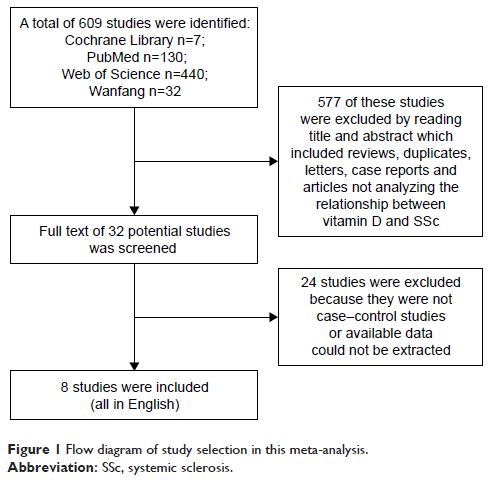108384
论文已发表
注册即可获取德孚的最新动态
IF 收录期刊
- 3.4 Breast Cancer (Dove Med Press)
- 3.2 Clin Epidemiol
- 2.6 Cancer Manag Res
- 2.9 Infect Drug Resist
- 3.7 Clin Interv Aging
- 5.1 Drug Des Dev Ther
- 3.1 Int J Chronic Obstr
- 6.6 Int J Nanomed
- 2.6 Int J Women's Health
- 2.9 Neuropsych Dis Treat
- 2.8 OncoTargets Ther
- 2.0 Patient Prefer Adher
- 2.2 Ther Clin Risk Manag
- 2.5 J Pain Res
- 3.0 Diabet Metab Synd Ob
- 3.2 Psychol Res Behav Ma
- 3.4 Nat Sci Sleep
- 1.8 Pharmgenomics Pers Med
- 2.0 Risk Manag Healthc Policy
- 4.1 J Inflamm Res
- 2.0 Int J Gen Med
- 3.4 J Hepatocell Carcinoma
- 3.0 J Asthma Allergy
- 2.2 Clin Cosmet Investig Dermatol
- 2.4 J Multidiscip Healthc

系统性硬化症患者的维生素 D 水平:一项荟萃分析
Authors An L, Sun M, Chen F, Li J
Received 26 June 2017
Accepted for publication 21 September 2017
Published 27 October 2017 Volume 2017:11 Pages 3119—3125
DOI https://doi.org/10.2147/DDDT.S144860
Checked for plagiarism Yes
Review by Single-blind
Peer reviewers approved by Dr Amy Norman
Peer reviewer comments 3
Editor who approved publication: Dr Tuo Deng
Purpose: This study aimed to investigate the association between vitamin D
and systemic sclerosis (SSc) by meta-analysis.
Methods: A comprehensive search was performed through
June 12, 2017. Pooled standardized mean difference (SMD) was used to estimate
the mean vitamin D difference between case and control groups (or between
diffused- and limited-type SSc). Pooled risk ratios (RRs) with 95% confidence
intervals (CIs) were used to assess the impact of vitamin D level on clinical
characteristics of SSc patients. All statistical analyses were performed using
Revman 5.0 software.
Results: The search yielded six studies with a total of
554 SSc patients and 321 healthy controls. The meta-analysis showed that SSc
patients suffered from decreased vitamin D levels (SMD =–8.72 ng/mL; 95% CI:
–10.11 to –7.32) compared with healthy controls. The meta-analysis results of
three studies with 240 SSc patients (93 diffused-type and 147 limited-type SSc
patients) showed that diffused-type SSc patients exhibited lower vitamin D
levels (SMD =–4.71 ng/mL; 95% CI: –8.98 to –0.44) compared with limited-type
SSc patients. However, vitamin D level was not found to be associated with
Rodnan score (SMD =–2.29 ng/mL, 95% CI: –8.49 to 3.91, P =0.47), systolic pulmonary
pressure (SMD =–1.68 ng/mL, 95% CI: –10.79 to 7.43, P =0.72), gastrointestinal ulcer
(RR =1.01, 95% CI: 0.53–1.93, P =0.98), or
pulmonary involvement (RR =1.01, 95% CI: 0.36–2.86, P =0.99) in SSc patients.
Conclusion: SSc patients exhibited lower vitamin D levels
compared with healthy controls. Vitamin D levels in diffused-type SSc patients
were significantly lower than those in limited-type SSc patients. The severity
of clinical features was not associated with the extent of vitamin D deficit.
Therefore, we hypothesize that SSc patients, especially diffused type, have
lower vitamin D levels, and that the decrease of vitamin D levels might not be
an accelerating factor of SSc severity.
Keywords: vitamin D,
systemic sclerosis, meta-analysis
